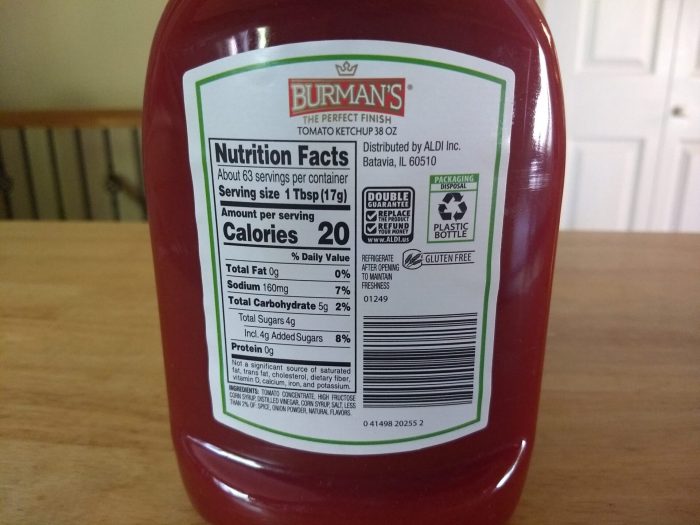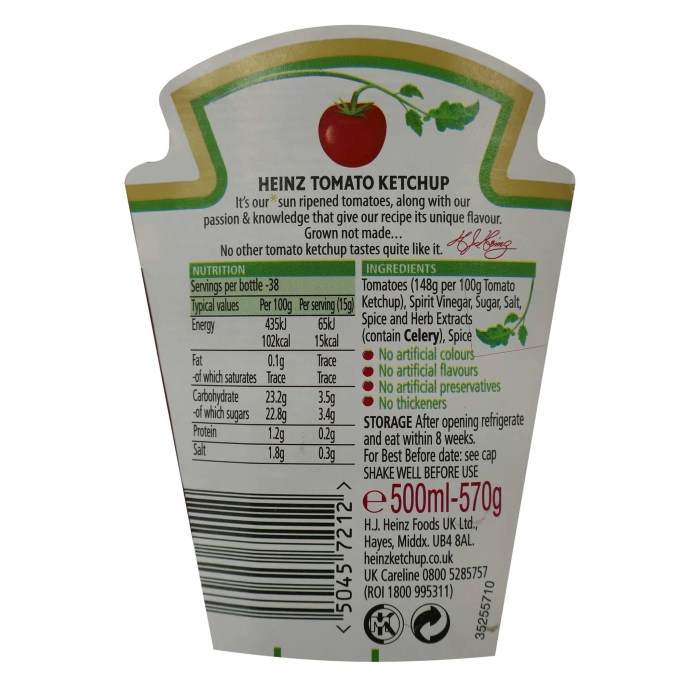
Sugar Content and Health Concerns

Nutrition facts of ketchup – Ketchup, a ubiquitous condiment, often adds a burst of flavor to our meals. However, lurking beneath its tangy taste is a significant amount of sugar, a factor that warrants careful consideration regarding its impact on our health. The seemingly innocent squirt of ketchup can contribute surprisingly to our daily sugar intake, raising concerns about potential long-term health consequences.The high sugar content in ketchup significantly contributes to its overall calorie count.
While a small amount might seem insignificant, regular consumption of ketchup, especially in large quantities, can easily lead to a considerable calorie surplus over time, potentially contributing to weight gain and related health problems. This is particularly relevant given that ketchup is frequently used as an addition to already calorie-dense meals like burgers, fries, and processed snacks.
Sugar Content in Different Ketchup Brands
A comparison of sugar content across various popular ketchup brands reveals considerable variation. This highlights the importance of checking nutrition labels before making purchasing decisions. While exact figures may fluctuate slightly due to variations in manufacturing processes and ingredients, the following table offers a general comparison (values are approximate and based on typical serving sizes):
| Ketchup Brand | Sugar Content (grams per serving) |
|---|---|
| Brand A | 4 |
| Brand B | 5 |
| Brand C | 3.5 |
| Brand D (Low Sugar Option) | 1.5 |
Note: Serving sizes may vary between brands. Always check the nutrition label on the specific product you are purchasing.
Health Risks Associated with High Sugar Intake from Ketchup
Excessive sugar consumption, even from seemingly innocuous sources like ketchup, is linked to several significant health problems. These include increased risk of weight gain, type 2 diabetes, heart disease, and dental issues. The added sugars in ketchup contribute to elevated blood sugar levels, potentially leading to insulin resistance and, in the long term, the development of type 2 diabetes.
Furthermore, high sugar intake is associated with increased inflammation in the body, a factor contributing to the development of heart disease. The high sugar content also promotes tooth decay due to the bacteria in the mouth feeding on the sugar, producing acids that erode tooth enamel. For example, a person consuming several tablespoons of ketchup daily with various meals might unknowingly exceed recommended daily sugar intake limits, potentially exacerbating these risks over time.
Choosing low-sugar alternatives or significantly reducing ketchup consumption can be a simple yet effective strategy to mitigate these potential health risks.
Sodium Content and its Impact

Ketchup, a ubiquitous condiment, often adds a burst of flavor to our meals. However, its sodium content is a significant factor to consider for those watching their salt intake. Understanding the role of sodium in ketchup and its potential health implications is crucial for making informed dietary choices.Sodium, primarily present as sodium chloride (table salt), is a key ingredient in ketchup, contributing to its savory taste and preservation.
Excessive sodium consumption is linked to a range of health problems, primarily impacting blood pressure. The body retains water when sodium levels are high, increasing blood volume and putting extra strain on the heart and blood vessels. This can lead to hypertension (high blood pressure), a major risk factor for heart disease, stroke, and kidney disease.
Sodium Intake Recommendations for Ketchup Consumption
Individuals with hypertension or those at risk of developing it should carefully monitor their sodium intake. The American Heart Association recommends limiting daily sodium consumption to less than 2,300 milligrams (mg), ideally aiming for less than 1,500 mg for many adults. A single tablespoon of regular ketchup can contain anywhere from 70-100mg of sodium, depending on the brand.
Therefore, frequent or generous use of ketchup can significantly contribute to daily sodium intake, especially for those already exceeding recommended limits. Monitoring portion sizes and considering lower-sodium alternatives is crucial for managing sodium intake effectively. For example, a person consuming 3 tablespoons of ketchup daily adds approximately 210-300mg of sodium to their diet, a substantial amount depending on their overall sodium intake.
Low-Sodium Ketchup Alternatives, Nutrition facts of ketchup
Fortunately, several low-sodium or no-sodium ketchup alternatives are available in the market. Many brands now offer reduced-sodium versions of their classic ketchup, often containing significantly less sodium while retaining a similar taste and texture. Consumers can easily find these options in most grocery stores. Additionally, some individuals choose to make their own ketchup using recipes that minimize or eliminate added salt, allowing for greater control over sodium content.
Ketchup, that ubiquitous condiment, often gets a bad rap, but its nutritional profile isn’t all that shocking. A quick glance at the sugar content usually raises eyebrows, but consider this: the calorie count pales in comparison to something like a shot of Baileys Irish Cream, whose nutritional information you can find here: nutrition facts baileys irish cream liqueur.
So, next time you’re reaching for the ketchup, remember the bigger picture – moderation is key, whether it’s creamy liqueur or tomato-based goodness.
Another option includes using other condiments sparingly as substitutes for ketchup, such as low-sodium tomato paste, or even a mixture of tomato puree and spices, to achieve a similar flavor profile. Reading nutrition labels carefully and comparing sodium content across different brands is essential when making these choices.
Ingredients and Additives

Ketchup, a ubiquitous condiment, boasts a deceptively simple ingredient list, yet the composition holds implications for health-conscious consumers. Understanding the role of each ingredient and its potential effects is crucial for making informed dietary choices. This section details the common components of ketchup, highlighting their functions and potential health impacts.
Common Ketchup Ingredients and Their Functions
The primary ingredients in most ketchups are tomatoes, sugar, vinegar, and salt. However, variations exist depending on brand and recipe. Many brands also include additives to enhance flavor, texture, and shelf life.
| Ingredient | Purpose | Potential Health Implications |
|---|---|---|
| Tomatoes | Provides the base flavor and color; source of lycopene (an antioxidant). | Generally beneficial; lycopene may offer protection against certain cancers. However, the processing of tomatoes into ketchup may reduce lycopene bioavailability. |
| Sugar | Adds sweetness and balances acidity; contributes to texture. | High sugar content contributes to increased calorie intake and can lead to weight gain, type 2 diabetes, and other health problems if consumed excessively. |
| Vinegar | Adds tartness and acidity, balancing the sweetness; acts as a preservative. | Generally considered safe in moderate amounts; can aid digestion for some individuals. Excessive consumption may cause digestive upset in others. |
| Salt (Sodium Chloride) | Enhances flavor; acts as a preservative. | High sodium intake is linked to high blood pressure, heart disease, and stroke. Individuals with hypertension should limit their sodium consumption. |
| High Fructose Corn Syrup (HFCS) | (Often present) Provides sweetness; cheaper alternative to sugar. | Similar health concerns to sugar; linked to metabolic syndrome and liver problems. Some studies suggest HFCS may have a more detrimental effect on metabolism compared to sucrose. |
| Spices (Onion Powder, Garlic Powder, etc.) | Enhance flavor and aroma. | Generally beneficial; provide antioxidants and other beneficial compounds. |
| Modified Food Starch | Thickens the ketchup, improving its texture and consistency. | Generally considered safe; however, some individuals may experience digestive issues. The specific type of modified food starch can impact its potential health effects. |
| Natural Flavors | Enhance and round out the overall flavor profile. | Generally considered safe, although specific components may vary. The exact composition of “natural flavors” is often proprietary information. |
Artificial Colors, Flavors, and Preservatives
While many ketchups utilize natural ingredients, some brands may incorporate artificial colors, flavors, and preservatives to enhance appearance, taste, and shelf life. These additives have been linked to various health concerns in some studies, although the extent of these effects remains a subject of ongoing research. For example, certain artificial colors have been associated with hyperactivity in children, while some artificial preservatives may trigger allergic reactions in sensitive individuals.
Consumers concerned about these additives should carefully review the ingredient list and opt for brands that prioritize natural ingredients.
General Inquiries: Nutrition Facts Of Ketchup
Is ketchup gluten-free?
Most commercially produced ketchups are gluten-free, but always check the label to confirm the absence of gluten-containing ingredients.
Can I make my own ketchup?
Absolutely! Homemade ketchup allows for greater control over ingredients and sugar content. Numerous recipes are readily available online.
Is ketchup suitable for a low-carb diet?
Due to its high sugar content, ketchup is generally not recommended for strict low-carb diets. However, small amounts might be acceptable depending on individual carb limits.
What are the best brands of low-sodium ketchup?
Several brands offer low-sodium or no-sodium ketchup options. Check your local grocery store or online retailers for a selection.